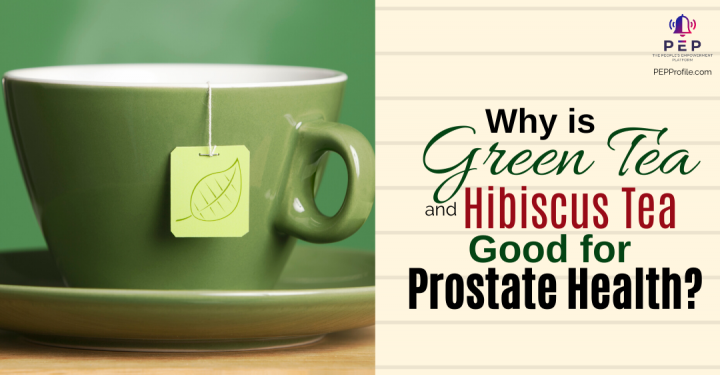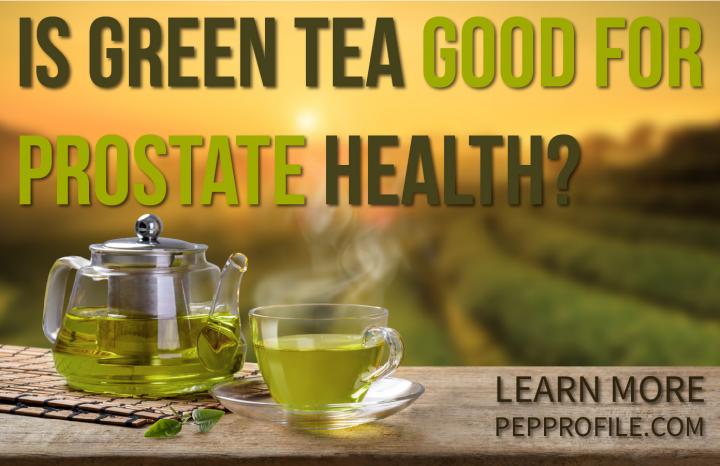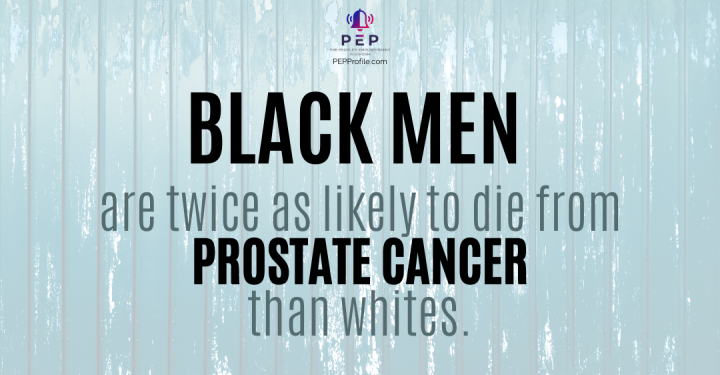Member Sign In
Login with email and password
No account yet? Register Now
I have gone through so many phases of dieting, from being vegan, to eating peleo, the candida diet which is oddly similar to what they now call the keto diet. I've eaten raw, done water fasting, intermittent fasting, etc. I have noticed significant differences in my urine flow based on what I choose to ingest.

Now I'm hearing that coffee is bad for the prostate because of its caffeine but I'm hearing people are improving their prostate performance with green tea and hibiscuses tea which have an exorbitant amount of caffeine. To get around the hearsay, I dug much deeper into why coffee would be bad for the prostate and why highly caffeinated teas such as green tea and hibiscus tea are considered beneficial.
According to science drinking coffee can be detrimental for men who have an enlarged prostate gland due to its high content of caffeine. However, studies have revealed that both green tea and hibiscus tea (both of which of are highly caffeinated) are among the top herbal prostate health remedies.
I will answer these questions and more on the correlation between these teas and prostate health. This article is for anyone concerned about getting the correct information on a topic that affects many.

Prostate cancer is the most common cancer among men, except for skin cancer. This year, an estimated 174,650 men in the United States will be diagnosed with prostate cancer. Approximately 60% of cases are diagnosed in men over 65.
The average age of diagnosis is 66; the disease rarely occurs before age 40. For unknown reasons, the risk of prostate cancer is about 60% higher in black men than in white men. [Statistics adapted from the American Cancer Society's (ACS) publication, Cancer Facts and Figures 2]
It is easy to get confused about what actually benefits our health and what is potentially harmful. The information in this article contains the up-to-date research available. It is my intention to help my readership find ways to live a high quality life through expanded health awareness.
Natural Properties of Green and Hibiscus Tea That Make Them Ideal for Prostate Health
Both types of teas are very good for prostate health according leading experts. You have probably assumed by now that not all teas are created equal.
I could probably do another article on tea quality, but I will stick to how they factor into prostrate health for now. The key word when it comes to these particular teas are antioxidants.
Hibiscus Tea
This plant varietal is native to North Africa and Southeast Asia. It is categorized as a herbal tea and it is famous for the reddish tint and has a sweet-tart type of flavor. It is delicious hot or cold and doesn’t have a medicinal taste to it that prevents it from being enjoyed easily. In addition to being rich in antioxidants and minerals, it has a high amount of Vitamin C and flavonoids. These antioxidants help protect the body against harmful free-radicals.
The neat things about hibiscus tea is that is actually free of caffeine. It is not made from the Camelia-Sanseis plant; it is made from the flower. This amazing tea also proves beneficial for a variety of other health conditions such as menstrual cramps, help with depression, digestion, blood pressure, and weight management. You can easily find hibiscus tea in health food stores and most supermarkets. Medical professionals advise against drinking more than a quart a day.

Green Tea
Green tea originated in China, but it is manufactured all over Asia. Green tea is made from the Camelia-Sinesis plant and contains caffeine. The amount of caffeine compared to coffee is significantly lower. Green tea gets its name from the fact that it differs from black teas because it does not undergo the same withering and oxidation process as does black teas.
For this reason, green tea has a shorter life-span for retaining all of its nutritional value and polyphenols, the chief component that assists in achieving better prostrate health. What makes green tea is especially helpful for all things prostrate is that it contains these phytochemicals that are absorbed by the prostrate more easily than any other tissues in the body.
Polyphenols are amazing phytochemicals as they are:
In addition to the above, Green Tea contains:
*Consuming green tea is considered to be extremely beneficial. However, the EGCG in green tea in large quantities can be harmful. Experts advise not to drink more than a few cups a day for optimal benefit.
Men with prostate cancer who drank green tea had less prostate tissue inflammation, linked to cancer growth, and other changes than those who didn't drink it, says Susanne M. Henning, PhD, RD, adjunct professor at the David Geffen School of Medicine at the University of California, Los Angeles.
''We were able to show the green tea polyphenols (antioxidants) reached the prostate tissue, and they did modify inflammation of the prostate," she says.
A Quick Lesson in Tea
So, you are probably wondering why is the caffeine in tea although, considerably less than coffee, less harmful? Tea has an interesting history – caffeine was first discovered in tea in 1827. Before it was called caffeine, it was called “theine” and later dropped because it was determined that the caffeine in tea and coffee were actually identical. However, they do have three distinguishing factors:

Clinical Studies That Give Supportive Evidence About Prostate Health
Study Title: Anti-Cancer Effects of Green Tea Polyphenols Against Prostate Cancer
Clinical Study Overview:
This clinical study article cites a conglomerate of multiple related clinical trials. The study conclusions indicate the molecules present in Green Tea protect and defend the body against prostate cancer. The clinical study article cites both in vitro and in vivo conducted testing methodologies.
It involved using several isolated bands of controlled study groups and trials to help determine the efficacy, safety, and potentiality of using green tea polyphenols and related extracts in combination therapies. They were able to isolate the molecular level mechanisms that assist in preventative action in regard to prostate cancer.
The study goals also included whether or not GTC’s (green tea catechins) would be effective in CRPC (castration-resistant prostate cancer) patients and/or elderly patients.
What is known is about prostate cancer is that it has a long latency period and is typically diagnosed late–so therefore it is seen most in men over the age of 60. Therefore, some questions are attempting to be answered, such as is Green Tea most effective as a preventative method, or a post-diagnosis combination therapeutic intervention.
Study Details:
The researchers conducted two case controlled study parameters. The first study control group in Japan of 140 PC cases:140 hospital controls showed an insignificant relationship between green tea consumption and PC risk.
The second study control group conducted in China of 130 PC cases:274 hospital controls showed that with increased consumption, frequency, and duration that green tea provided a protective effect against PC.
*The study tables highlighting the exact amounts of tea given are shown within the study contents and referenced below for further reading.
The data regarding these studies is quite comprehensive so I are just citing some relevant information to help you understand the scientific processes and efficacy of these green tea polyphenols.
Multiple Study Analysis on GTC’s:
Multiple clinical study case cohorts and randomized study principles were conducted as the researchers were trying to understand the exact mechanism of action regarding green tea catechins. One of the studies effectively concluded that GTC’s could be safely applied towards the prevention of PC. The study details indicated the following:
In a double blind, placebo controlled study, 60 Caucasian males volunteered for this study. They showed HG-Pin lesions prior to enrollment and had no prior treatment therapy. The treated men took 3x 200mg capsuled daily for a total intake of 600mg per day of GTC capsules. The results of this study were: After 1 year, only 1 tumor was diagnosed of the 30 GTC treated men, whereas 9 tumors where found within the 30 men that were given placebos.
Overall study conclusion: By treating with GTC’s, it showed an 80% reduction in PC diagnosis
Further research also found that Green tea catechins influence:
Article Highlights
I covered a lot of information in this article about the wonderful benefits of these natural plant based tea options. It is exciting to see that they can be used to prevent certain cancers, specifically prostate cancer. To summarize what we've learned, here are a few of the main takeaways:
I Want to Hear From You:
=-=-=-=-=-=-=-=-=-=-=-=
REFERENCES:
https://www.ncbi.nlm.nih.gov/pmc/articles/PMC3832054/
https://www.cancer.net/cancer-types/prostate-cancer/statistics
https://www.teaclass.com/lesson_0112.html
https://www.healthline.com/nutrition/egcg-epigallocatechin-gallate
https://www.ncbi.nlm.nih.gov/pmc/articles/PMC6337309/
DISCLAIMER: This site contains affiliate links to products. I may receive a commission for purchases made through these links.
Login with a social network